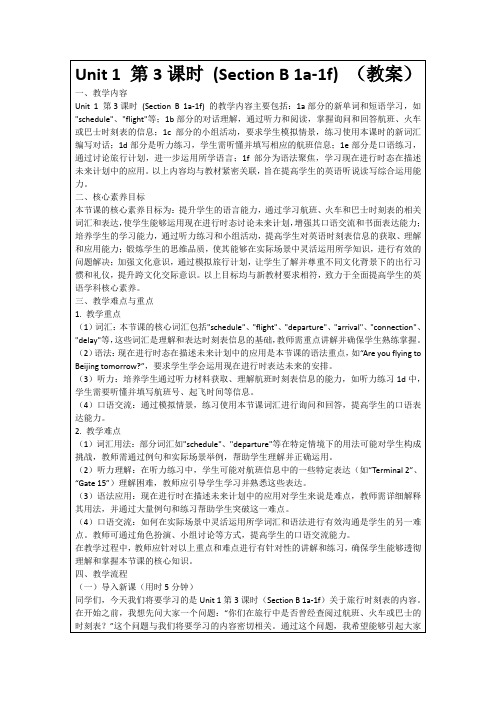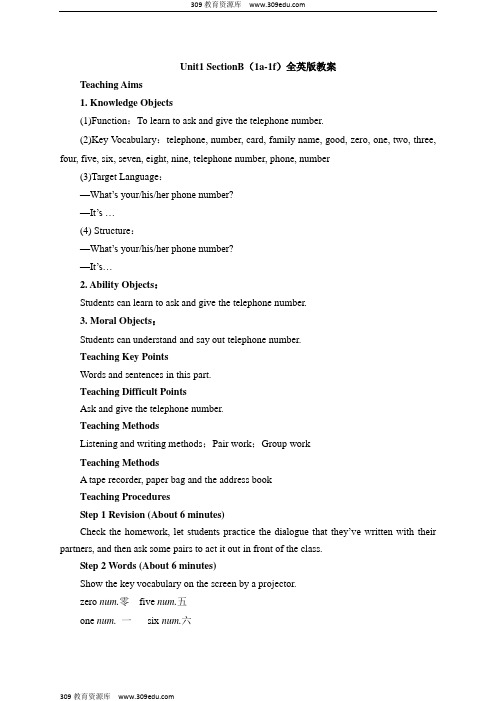Unit1 Section B教案
人教版英语八年级上册教案:Unit1 SectionB(1a-1e)

Unit1 SectionB〔1a-1e〕教案【教材版本与册数】新目的人教版八年级上册【单元名称】Unit 1 Where did you go on vacation ?【课时】SectionB 1a-1e〔第3课时〕【课型】Listening and Speaking〔听说课〕第 1 页第 2 页第 3 页第 4 页第 5 页附:教学活动设计第 6 页第 7 页第 8 页第 9 页第 10 页第 11 页第 12 页Exercise: Translate.1.下次放假,我想去香港。
听起来很有趣。
2.下次放假,我不想去雨中爬山了。
听起来真得很恐惧。
3.–丽萨,你的假期过得怎么样?-- 太棒了!我跟我家人去了香港。
-- 在那儿你干什么特别的事儿了吗?-- 是呀,我们去了一个有趣的公园。
Answers:1.On my next vacation, I want to goto Hong Kong. That sounds really interesting.2.On my next vacation, I don’t want to climb mountains in the rain. That sounds really terrible.3.-- Hi, Lisa. How was your vacation?-- It was great! I went to Hong Kong with my family.-- Did you do anything special there?-- Well, we went to a fun park.,根据结果反应,进展精准教学。
】再次为学生理清本堂课重点,小大局部学生根据老师提示能否回忆起本堂课内容。
第 13 页第 14 页3. Homework1〕.以“My Unforgettable Vacation〞为题, 写一篇短文。
2〕. Preview the new words and phrases.3〕. Preview Jane’s diaries .的可持续性评价。
Unit1第3课时(SectionB1a-1f)(教案)

一、教学内容
Unit 1第3课时(Section B 1a-1f)的教学内容主要包括:1a部分的新单词和短语学习,如"schedule"、"flight"等;1b部分的对话理解,通过听力和阅读,掌握询问和回答航班、火车或巴士时刻表的信息;1c部分的小组活动,要求学生模拟情景,练习使用本课时的新词汇编写对话;1d部分是听力练习,学生需听懂并填写相应的航班信息;1e部分是口语练习,通过讨论旅行计划,进一步运用所学语言;1f部分为语法聚焦,学习现在进行时态在描述未来计划中的应用。以上内容均与教材紧密关联,旨在提高学生的英语听说读写综合运用能力。
五、教学反思
在今天的教学过程中,我注意到同学们对时刻表这一新概念表现出浓厚的兴趣。通过引入旅行中的实际情境,大家能够较快地理解并掌握相关词汇和现在进行时态的用法。然而,我也发现了一些需要改进的地方。
在导入新课环节,我意识到提问的方式可以更加开放,鼓励学生分享自己的旅行经历,这样既能激发他们的学习兴趣,又能让他们在实践中感受时刻表的重要性。在今后的教学中,我会尝试让同学们更多地参与进来,以提高他们的学习积极性。
(三)实践活动(用时10分钟)
1.分组讨论:学生们将分成若干小组,每组讨论一个与时刻表相关的实际问题。
2.实验操作:为了加深理解,我们将进行一个简单的角色扮演活动,模拟在机场询问和回答航班信息的场景。
3.成果展示:每个小组将向全班展示他们的讨论成果和角色扮演活动。
(四)学生小组讨论(用时10分钟)
1.讨论主题:学生将围绕“时刻表在实际生活中的应用”这一主题展开讨论。他们将被鼓励提出自己的观点和想法,并与其他小组成员进行交流。
人教版英语九年级全册Unit1 SectionB(1a-1e)精品教案

Unit1 SectionB〔1a-1e〕精品教案【学习目标】一、熟练掌握以下词汇:make mistakes, pronounce, partner, increase, speed二、口、笔头掌握以下句型:1. I don’t have a partner to practice English with.2. Maybe you should join an English club.3. I don’t know how to increase my reading speed.4. Why don’t you join an English language club to practice speaking English?三、1.能用本课句型陈述自己在学习中遇到的困难。
2.能用“Maybe you should…〞, “Why don’t you…〞等句式为他人提出建议。
四、学会面对困难和挑战,学会解决问题。
并能在学习和生活中互相帮助,激发学生的主动性和学习兴趣。
【教学重难点】使用本课句型,针对学习困难,提出合理的建议。
【学习过程】【课前准备】Show a picture of Liu Wei.T:Do you know who he is?Let’s watch a video about him and then answer the questions:What happened to him?How did he solve the challenges he faced?Everyone faces difficulties and challenges. Let’s talk about them.教学设计说明:利用励志少年刘伟创设情景,激发起学生的探究欲望。
Before listening1.Work on 2d.Role-play the conversation in Section A 2d.2. Find out the difficulties Jack talks about. Then fill in the chart with the information. Read also for the solutions Annie suggests.教学设计说明:复习旧知,导入新课。
人教版英语七年级上册教案:Unit1SectionB(1a-1f)

T: Good morning, everyone. My name is Peter. What’s your name, please?
S1: My name is Lily.
T: Hello, Lily. Nice to meet you!
—It's…
②—What's your first/last name?
—My first/last name is…
③—What's his/her first/last name?
—His/Her first/last name is…
3) 能辨别英文中的姓氏与名字,了解中英文中姓名之间的区别。
S1: Nice to meet you, too.
T: And what’s your name?
S2: My name is…
2. Revision
Part one:
T: S1, what's his name?
S1: His name is …
T: S2, what’s her name?
S2: Her name is …
Let the Ss look at 1a, then play the tape.
Ss listen and repeat the numbers.
2.听中的活动设计遵循语言规律,由易到难逐层递进,充分体现语言输入到语言输出的完整过程。
3.听后的活动设计体现对文本内容的深度挖掘和文本再构,体现了对学生思维品格的训练与培养。
附:教学活动设计
步骤
过程
措施(教师活动与学生活动)
人教版英语七年级上册Unit1 SectionB(1a-1f)全英版教案

Unit1 SectionB(1a-1f)全英版教案Teaching Aims1. Knowledge Objects(1)Function:To learn to ask and give the telephone number.(2)Key V ocabulary:telephone, number, card, family name, good, zero, one, two, three, four, five, six, seven, eight, nine, telephone number, phone, number(3)Target Language:—What’s your/his/her phone number?—It’s …(4) Structure:—What’s your/his/her phone number?—It’s…2. Ability Objects:Students can learn to ask and give the telephone number.3. Moral Objects:Students can understand and say out telephone number.Teaching Key PointsWords and sentences in this part.Teaching Difficult PointsAsk and give the telephone number.Teaching MethodsListening and writing methods;Pair work;Group workTeaching MethodsA tape recorder, paper bag and the address bookTeaching ProceduresStep 1 Revision (About 6 minutes)Check the homework, let students practice the dialogue that they’ve written with their partners, and then ask some pairs to act it out in front of the class.Step 2 Words (About 6 minutes)Show the key vocabulary on the screen by a projector.zero num.零five num.五one num.一six num.六two num.二seven num.七three num.三eight num. 八four num.四nine num.九number n.数字phone/telephone n.电话it pron.它it’s = it isphone/telephone number 电话号码Let students read the words over and over again until they remember them by heart.Step 3 Listening (la, 1b) (About 6 minutes)Let students listen to the tape for the first time and then listen again, this time, students repeat the numbers.Then write 281—9375 on the blackboard. Let students read it one by one. Tell them how the telephone number is divided up.Play the recording twice, and students write the numbers in the blanks.Step 4 Practice (About 20 minutes)1. Make a survey about your classmates’ telephone numbers.Ask your students to make a survey about their classmates’ telephone numbers and try to fill in the chart.Listen 1d—le. Play the recording three times, the first time let students just listen. The second time, let students write the letter of the person’s telephone number in the space after the person’s name. The last time, let students fill in the missing numbers.Step 5 Play games (About 5 minutes)Ask your students to write their phone numbers on a piece of paper and put it in a bag. Then let one student take out a piece of paper from the bag. Next, find the number’s owner on the piece of paper.Step 6 Homework (About 2 minutes)Practice asking for and giving your phone numbers.Blackboard Design。
Unit1SectionB1a-1f教案

(三)实践活动(用时10分钟)
1.分组讨论:学生们将分成若干小组,每组讨论一个与描述人物或物品特征相关的实际问题。
2.实验操作:为了加深理解,我们将进行一个简单的角色扮演活动。这个活动将演示如何在实际情景中使用所学句型描述人物特征。
(3)听力:学生在听力练习中可能难以捕捉到描述人物特征的关键信息。教师可以引导学生先关注关键词,逐步提高听力技巧。
(4)口语:部分学生可能在口语表达时,不能流畅地运用所学词汇和句型描述人物和物品特征。教师应鼓励学生多开口,提供示范和指导,帮助学生提高口语表达能力。
(5)写作:学生在编写描述人物或物品特征的短文时,可能存在句子结构不清晰、语法错误等问题。教师可以提供写作框架,指导学生逐步完成写作任务,并针对共性问题进行讲解和纠正。
(3)语法:理解并运用一般现在时描述人物和物品的特征。教师应通过实例讲解,让学生明确一般现在时的用法。
2.教学难点
(1)词汇:部分学生可能在记忆和使用描述人物特征的词汇时遇到困难。教师可以通过图片、例句和词汇游戏等方法帮助学生记忆。
(2)句型:学生在运用“Have/has +身体特征”和“Be +形容词”句型时,可能会混淆。教师应通过实际操作、角色扮演等互动活动,让学生在实际语境中练习,突破难点。
5.课堂氛围的营造:在本节课中,我努力营造一个轻松、愉快的课堂氛围,让学生在愉悦的情感状态下学习。但从教学反思来看,仍需关注部分学生在课堂中的情感波动,及时调整教学方法,确保每个学生都能在良好的氛围中学习。
3.成果分享:每个小组将选择一名代表来分享他们的讨论成果。这些成果将被记录在黑板上或投影仪上,以便全班都能看到。
Unit1第3课时SectionB(1a-1e)(教案)

本节课的核心素养目标旨在培养学生的语言能力、思维品质、文化意识和学习能力。
1.语言能力:通过学习与旅行相关的词汇和句型,提高学生的词汇量和语言表达能力,使其能够熟练运用所学进行情境交流。
2.思维品质:通过听力、阅读和讨论等教学活动,锻炼学生的分析、推理和评价能力,培养其批判性思维和创造性思维。
1.讨论主题:学生将围绕“如何用英语描述旅行经历”这一主题展开讨论。他们将被鼓励提出自己的观点和想法,并与其他小组成员进行交流。
2.引导与启发:在讨论过程中,我将作为引导者,帮助学生发现问题、分析问题并解决问题。我会提出一些开放性的问题来启发他们的思考。
3.成果分享:每个小组将选择一名代表来分享他们的讨论成果。这些成果将被记录在黑板上或投影仪上,以便全班都能看到。
1.理论介绍:首先,我们要了解与旅行相关的交通工具的基本词汇。这些词汇包括subway, train, ship, plane等,它们在我们的旅行生活中扮演着重要角色。
2.案例分析:接下来,我们通过听力练习和阅读短文来了解这些交通工具在实际旅行中的应用,以及如何用英语描述旅行经历。
3.重点难点解析:在讲授过程中,我会特别强调一般现在时和一般过去时的运用,以及如何描述旅行经历。对于难点部分,我会通过举例和对比来帮助大家理解。
(2)听力理解:学生ຫໍສະໝຸດ 能在听力练习中难以捕捉到关键信息,导致理解偏差。
举例:教师可引导学生进行预听、跟读和模仿,提高听力水平,同时教授学生如何抓住关键信息。
(3)口语表达:学生在角色扮演和小组讨论中,可能存在词汇量不足、表达不流畅等问题。
举例:教师应鼓励学生多参与课堂活动,提供丰富的语言环境,帮助学生提高口语表达能力。
(3)阅读理解:理解关于旅行经历的短文,提取关键信息。
Unit1 SectionB(1a 1c)教案 人教版七年级英语上册

评价任务
1.说一说,能迅速准确说出数字。
2.听听力,能准确写出电话号码,并进行搭配。
3.能询问他人姓名及电话并互相问候。
教学过程
(每个学习目标的达成需呈现学习目标、学习活动、评价标准、教师活动、目标达成情况五个方面)
1.Revision
Introduce your classmates to the teacher.
课题:My name’s Gina.
教材来源
初中七年级《英语》教科书/人民教育出版社
内容来源
七年级《英语(上册)》Unit1
主题
My name’s Gina.
课时
共4课时第3课时
授课对象
七年级学生
设计者能流利地用英语询问和告知电话号码。发展和培养学生学习英语的兴趣,使学生树立自信心,养成良好的学习习惯,形成有效的学习策略,发展学生自主学习的能力和合作精神是中学英语的教学的基本任务。
6.小组活动:Finish 1f
7.Exercise
作业/拓展
模仿课本对话编写对话并准备在下节课上展示。
教学反思
His name is .../Her name is.../My name is...
2.听录音读单词0--9,并熟练背默数字0--9.
3. Game看老师的手指,说出数字
4. Listen 1b
(1)听对话,写出电话号码
(2)电话号码的读法
Listen 1d、1e
5. Practice 1c
----What’s your telephone number?
----It’s ______./My telephone number is ________.
- 1、下载文档前请自行甄别文档内容的完整性,平台不提供额外的编辑、内容补充、找答案等附加服务。
- 2、"仅部分预览"的文档,不可在线预览部分如存在完整性等问题,可反馈申请退款(可完整预览的文档不适用该条件!)。
- 3、如文档侵犯您的权益,请联系客服反馈,我们会尽快为您处理(人工客服工作时间:9:00-18:30)。
Section BSection B 1 (1a-2e)Step 1 DiscussionDo you have difficulty in learning English? What things are difficult for you?1a Learning English can be difficult. What things are difficult for you? Read the list.Check (✓) the statements that are true for you.____ I can't pronounce some of the words.____ I can't always understand spoken English.____I don't know how to increase my reading speed.____I can't spell some English words.____I often make mistakes in grammar.注解:1. I can’t always understand spoken English.2. I don’t know how to increase my reading speed.1b What other things are difficult for you? Make a list.1. I don’t know enough words to write well.2.____________________________________3.____________________________________Step 2 Listening and speaking1c Paul finds it difficult to learn English. Listen and complete the learning challenges he talks about.1d Listen again. Complete the solutions.Answers: Listening, write the new words, join an English language club, pen pal 1e Role-play conversations using the information in 1c and 1d.A: I don’t have a partner to practice English with.B: Maybe you should join an English club.注解: Maybe you should join an English club.Step 3 Discussion2a What good learning habits can you think of? Make a list and discuss them with your partner.Step 4 Reading2b Read the passage quickly. Which four habits of successful learners are mentioned? 2c Read the passage again and answer the questions.1. Does the writer think that everyone is born with the ability to learn well? Do youagree? Why or why not?2. Why is it a good idea to connect something you need to learn with somethingyou are interested in?3. What do the sayings "use it or lose it" and "practice makes perfect" mean? Doyou agree with them?4. Do good learners learn from mistakes or are they afraid of making mistakes?5. What study skills does the writer talk about? Do you have those study skills?6. Do you agree that learning is a lifelong journey? Why or why not?Step 5 Language points1. It is also easier for you to pay attention to it for a long time.该句句型是It is adj. for sb. to do sth.【注】若形容词表示事物特征的,如:easy, difficult, hard, important等,须用介词for。
It’s +adj. (kind, honest, friendly) + (of sb.) to do sth.【注】若形容词表示人的性格、品质与特点,如:good, kind, nice, wrong等,用介词of。
2. Good learners often connect what they need to learn with something interesting. connect v.意为“连接;与……有联系”当表示把两个物体(A和B)连接起来时,常用结构是connect A to / with / and B,其中to表示把A接到B上,多用来指动作而不指状态。
e.g. Connect the speaker to / with the record player, please.The subway connects the train station and / with the airport.3. Good learners think about what they are good at and what they need to practice more.【think相关短语】think about 想起,考虑think of 想到,认为think over 仔细考虑think out 考虑好think up 想出来think through 认真地考虑4. Even if you learn something well, you will forget it unless you use it.even though=even if 即使, 引导让步状语从句5. …, they are not afraid of making mistakes.(1) be afraid of sth/doing sth害怕做某事,担心(出现某种不良后果)。
(2) be afraid to do sth 害怕去做…, “怕”或“不敢”去做某事。
(3) be afraid +that 恐怕…, 用于礼貌地表达可能令人不愉快的消息。
(4) 回答别人的提问时,可用省略形式I’m afraid so (not)。
6. They even ask each other and try to find out the answers.(1) try on 试穿(2) try to do sth. 努力做某事,侧重尽力做(3) try doing sth. 试图做某事,侧重尝试做(4) try one’s best to do sth.= do one’s best to do sth. 尽某人最大努力做某事find out寻找,查明7. But whether or not you can do this well depends on your learning habits.8. Knowledge comes from questioning. question在句子中作动词,是“质疑;质问;提问”的意思。
例如:I just accepted what he told me. I never thought to question it.当question用作动词,表示对某人或事物进行提问时,是一种十分正式的用法,有“提问;询问;审问”的意思。
例如:The police questioned him for three hours before letting him go.Step 6 Groupwork2e Do you think you are a good learner? What learning habits do you think are useful? Discuss with your group and share your ideas with the class.A: I think another way to become a successful learner is by trying to think about the same thing in different ways.B: I agree. I believe that…Step 7 ExerciseI. 写出下列短语1. 注意,关注2. 把…和…联系起来3. 天生具有…4. 取决于5. 即使6. 害怕7. 犯错误8. 向…学习9. 熟能生巧II. 完成句子1. 好的学习者时常把他们需要学习的和有趣的东西联系起来。
Good learners often _______ what they need __ _____ ____ somethinginteresting.2. 即使你学得一些东西好,但你如果不用它将会忘记。
_____ __ you learn something well, you will forget it ______ you use it. 3. 好的学习者也不害怕犯错误。
Good learners are also ___ _____ __ making __________.Step 8 HomeworkWrite a sentence using each word in the box.Section B 2 (3a-selfcheck)Step 1 Free talkTalk about how we can learn English well with your partner.How can we learn English well?by taking part in relevant activities in Englishby reading English story bookby listening to tapes over and over againby making word cardsby watching videosStep 2 3a-3b3a Your friend wants to improve his/her English and asks you for help. What are the three best ways to learn and why? Make some notes in the chart.3b Write a letter to your friend. Give him /her some advice about the best ways to learn English. Use your notes in 3a.Use the following expressions to help you:There are three good ways to …I think you should…If you do this, you will…It is also a good idea to …because…You could try to improve your English by…This will help you to…SampleDear...,There are three good ways to learn English. You can learn by making word cards, reading story books, listening to tapes and so on. I think you should learn English by reading some English story books. If you do this, you will improve your reading s peed. …Your friend, …Step 3 Self check1.Fill in the blanks with the words in the box.practice develop remember preparetake notes until worry about everythingAre you stressed out each time you have a test? You don’t have to be if you __________ smart study skills. Remember to ___________ in class and review them on your own or with friends after class. Then __________ what you learned by doing exercises. Try to study and _________ information bit by bit instead of waiting________ the last minute to study ___________ at once. If you __________ well fora test, then there’s nothing to ___________!2. Number these sentences in order to make a conversation._____What’s the matter?_____ Well, I practice my listening by listening to the tape over and over again until I can understand everything._____ So you want to practice your listening?_____ Hi, Jake. I need your help._____ Uh-huh. Do you have any advice?_____OK, I’ll try that._____ I have a listening test next week.3. Give advice to these people.1. Jane is a very slow reader.She should improve her reading speed _________________________________. 2. Li Ming wants to improve his listening.He could practice his listening __________________________________.3. Meiping doesn’t know many English words.She could learn more words ____________________________.Step 4 Exercises单项选择题。
